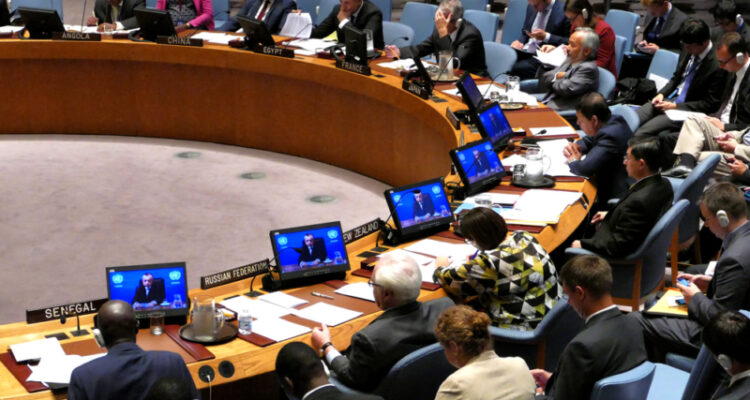Washington has suggested that it would veto the new Algerian resolution.
By Mike Wagenheim, JNS
The United Nations Security Council’s committee on new members reported on Tuesday that it could not reach a consensus on the revived application for full Palestinian U.N. membership.
Algeria, the Arab world’s de facto representative on the council, has drafted its own resolution and plans to put the application up for a decisive vote on Thursday afternoon.
Washington has suggested that it would veto such an application.
The Committee on the Admission of New Members—which includes representatives of all the members of the Security Council—met twice last week to discuss the Palestinian application, which was first filed in 2011.
This month, as more than a dozen years ago, the committee did not reach a consensus.
Per longstanding U.N. practice, the committee would not recommend a vote of the full Security Council without its own consensus on the matter.
The committee’s report did not reveal or detail the views or vote of specific countries, instead providing a broad outline of last week’s discussions.
One nation or several countries said during the meeting that full membership for Palestinians—who have had non-state observer status since the U.N. General Assembly granted it in 2012—“would be an important step toward a two-state solution” and put the Palestinians on a “sovereign equality basis with Israel,” per the report.
Some 140 U.N. member states have recognized Palestinian statehood.
Another view articulated during the meetings was that the Palestinians may not meet all of the requirements for membership “in light of the situation on the ground,” per the report.
This appeared to refer to the lack of control of the Palestinian Authority, which the United Nations recognizes as the legal governing Palestinian entity, over the Gaza Strip, which the Hamas terror group rules.
Palestinians also haven’t defined borders to their proposed state.
At least one state said during the meeting that the Palestinian application is “premature” and that a “negotiated solution remained the only viable option for a long-term sustainable peace,” according to the report.
It was not stated explicitly in the report, but Washington has lodged objections based on 2011 congressional legislation, which prohibits the U.S. government from funding the United Nations or any of its agencies and organizations if any U.N. body accepts the Palestinians as a full member.
Washington contributes up to 25% of the annual U.N. budget.
On Tuesday evening, Algeria decided to move on its own, drafting a resolution to grant the Palestinians full membership despite the lack of committee consensus.
U.S. diplomats and officials have signaled, without saying it outright, that Washington would issue a veto in Thursday afternoon’s Security Council vote.
The Algerian resolution is expected to garner solid support from 10 or 11 of the 15 members of the council.
American allies Japan, South Korea and the United Kingdom are question marks.
The resolution would need nine votes to pass, with none of the council’s five permanent members vetoing.
The Arab group of 22 countries issued a statement Tuesday evening calling for all members of the Security Council to vote for Algeria’s resolution.
“At the very least, we implore council members not to obstruct this critical initiative,” it stated, calling full Palestinian U.N. membership “a long overdue step that should have been taken not just in 2011, but since 1948.”
Palestinian Arabs turned down statehood in 1948, instead favoring an attempted Arab war of annihilation against the nascent state of Israel.
Thursday’s vote will come just hours after a ministerial-level Security Council meeting on the Israeli-Palestinian file.
The session, which will draw foreign ministers and other high-ranking diplomats, will come with added media attention, which is why it appears Algeria is trying to force Washington to reveal in such a setting whether it will veto.
Iranian Foreign Minister Hossein Amir-Abdollahian is expected to attend, just days after Tehran’s missile and drone attack on Israel.
Prince Faisal bin Farhan and Ayman Safadi, the foreign ministers for Saudi Arabia and Jordan, will also be in New York.
Both Jordan and Saudi Arabia helped defend Israel from Iran’s onslaught last weekend, shooting down Iranian projectiles and possibly relaying intelligence.
The Israeli Foreign Ministry has given no indication that its top diplomat, Israel Katz, will fly to New York for the meeting.
Notably, neither U.S. Secretary of State Antony Blinken nor U.N. Ambassador Linda Thomas-Greenfield will attend, as both are overseas. Robert Wood, deputy U.S. envoy to the United Nations, will represent Washington.





